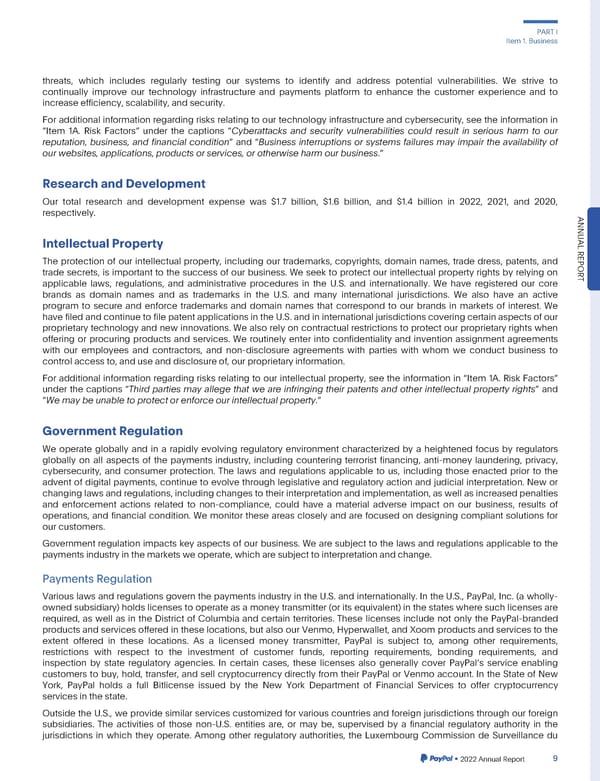PARTI Item1. Business threats, which includes regularly testing our systems to identify and address potential vulnerabilities. We strive to continually improve our technology infrastructure and payments platform to enhance the customer experience and to increaseefficiency,scalability,and security. For additional information regarding risks relating to our technology infrastructure and cybersecurity, see the information in “Item 1A. Risk Factors” under the captions “Cyberattacks and security vulnerabilities could result in serious harm to our reputation, business, and financial condition” and “Business interruptions or systems failures may impair the availability of ourwebsites,applications,productsorservices,orotherwiseharmourbusiness.” ResearchandDevelopment Our total research and development expense was $1.7 billion, $1.6 billion, and $1.4 billion in 2022, 2021, and 2020, respectively. ANNU IntellectualProperty AL The protection of our intellectual property, including our trademarks, copyrights, domain names, trade dress, patents, and REPOR trade secrets, is important to the success of our business. We seek to protect our intellectual property rights by relying on applicable laws, regulations, and administrative procedures in the U.S. and internationally. We have registered our core T brands as domain names and as trademarks in the U.S. and many international jurisdictions. We also have an active program to secure and enforce trademarks and domain names that correspond to our brands in markets of interest. We havefiled and continueto file patent applicationsin the U.S. and in internationaljurisdictionscovering certain aspects of our proprietary technology and new innovations. We also rely on contractual restrictions to protect our proprietary rights when offering or procuring products and services. We routinely enter into confidentiality and invention assignment agreements with our employees and contractors, and non-disclosure agreements with parties with whom we conduct business to control accessto, and use and disclosureof, our proprietaryinformation. For additional information regarding risks relating to our intellectual property, see the information in “Item 1A. Risk Factors” under the captions “Third parties may allege that we are infringing their patents and other intellectual property rights” and “Wemaybeunabletoprotectorenforceourintellectualproperty.” GovernmentRegulation Weoperate globally and in a rapidly evolving regulatory environment characterized by a heightened focus by regulators globally on all aspects of the payments industry, including countering terrorist financing, anti-money laundering, privacy, cybersecurity, and consumer protection. The laws and regulations applicable to us, including those enacted prior to the advent of digital payments, continue to evolve through legislative and regulatory action and judicial interpretation. New or changinglawsandregulations,includingchangestotheirinterpretationandimplementation,aswellasincreasedpenalties and enforcement actions related to non-compliance, could have a material adverse impact on our business, results of operations, and financial condition. We monitor these areas closely and are focused on designing compliant solutions for ourcustomers. Government regulation impacts key aspects of our business. We are subject to the laws and regulations applicable to the paymentsindustryinthemarketsweoperate,whicharesubjecttointerpretationandchange. PaymentsRegulation Various laws and regulations govern the payments industry in the U.S. and internationally. In the U.S., PayPal, Inc. (a wholly- ownedsubsidiary)holdslicensesto operateas a money transmitter(or its equivalent)in the states where such licenses are required, as well as in the District of Columbia and certain territories. These licenses include not only the PayPal-branded products and services offered in these locations, but also our Venmo, Hyperwallet, and Xoom products and services to the extent offered in these locations. As a licensed money transmitter, PayPal is subject to, among other requirements, restrictions with respect to the investment of customer funds, reporting requirements, bonding requirements, and inspection by state regulatory agencies. In certain cases, these licenses also generally cover PayPals service enabling customers to buy, hold, transfer, and sell cryptocurrency directly from their PayPal or Venmo account. In the State of New York, PayPal holds a full Bitlicense issued by the New York Department of Financial Services to offer cryptocurrency servicesin the state. Outside the U.S., we provide similar services customized for various countries and foreign jurisdictions through our foreign subsidiaries. The activities of those non-U.S. entities are, or may be, supervised by a financial regulatory authority in the jurisdictions in which they operate. Among other regulatory authorities, the Luxembourg Commission de Surveillance du •2022AnnualReport 9
 2023 Annual Report Page 156 Page 158
2023 Annual Report Page 156 Page 158